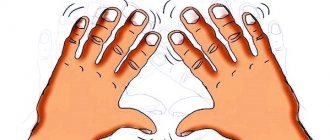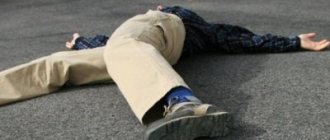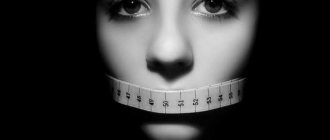Definition of disorder
Medical scientists are divided in their opinion: on the one hand, psychasthenia is a neurosis that is included in the international classification of diseases by the World Health Organization. On the other hand, it is a character trait that significantly complicates life. A person with psychasthenia is overly suspicious of everything that happens to him. He is worried about the unknown and finds it difficult to make a choice even in an insignificant situation.
What psychasthenia is can be understood by translating the term from Greek - the literal translation sounds like impotence of the soul. Some consider this a lack of character. However, such people have a character and, according to the classification of personality disorders, it is called anxious-doubting or anxious-suspicious.
Attention! The psychasthenic personality type keeps its owner in constant anticipation of negative events; any situation seems potentially dangerous.
Thinking of psychasthenics
The thinking of people suffering from psychasthenic psychopathy is characterized by rationality; they perform all their actions based on logic. Before coming to any opinion (even on trivial issues), they carefully weigh all the pros and cons and try to get to the very essence of the issue. Although no one needs all this groundless philosophizing, because psychasthenics are not among the active people who embody their thoughts and goals in life.
Such people try to comprehensively analyze their actions on their own and place incredibly high demands on themselves. A psychasthenic person considers himself worse than other people; he seems inactive, ugly, inept, weak, etc. For all problems and failures, he blames only himself. All people suffering from psychasthenia have a pronounced inferiority complex.
Symptoms of psychasthenic psychopathy
Obsessive-compulsive personality disorder - what is it?
The disease is diagnosed by identifying specific symptoms that can be used to distinguish it from other similar disorders:
- motor awkwardness;
- constant and deep self-analysis;
- inability to make an important decision if one of the outcomes of events may be dangerous;
- merciless self-criticism;
- lack of confidence in everything (in oneself and the situation);
- excessive conscientiousness.
Any failure that happens in reality to every person develops a feeling of inferiority. Therefore, if some action threatens the slightest failure, the psychasthenic will try to avoid this by completely refusing to participate in the dubious event. This often becomes the cause of laziness, which easily develops in a person who is afraid of making mistakes.
Diffidence
Signs of the syndrome in children
Psychasthenics, as a personality type, can be recognized starting from school years. Such children are especially slow, which is explained by a manic desire to double-check the work done several times. They are very sensitive to the teacher’s assessment, which is why they try to eliminate any shortcomings. Difficulties in the learning process are created by poorly developed mechanical memory. Creative thinking comes easier to such children.
Increased nervous excitability is sometimes noticed in older groups of kindergarten, when the child experiences the expectation of delayed parents with particular difficulty. Often there are special waiting rituals for such children, which are some kind of signs that “can speed up” the appearance of a long-awaited relative. This could be counting objects in a certain order, rocking in a chair, or rhythmic tapping. At the same time, anything that can disrupt the course of an important ritual for a child causes a sharply negative reaction.
Psychasthenia can appear at an early age
Thanks to their slowness and shyness, students with a psychasthenic personality type learn the material more easily. This is due to the fact that they are happy to try to understand the topic, take their time, study literature, think well logically, and easily systematize information in their minds. High academic performance is important to them, which they achieve with ease.
Interesting. It is impossible to notice a psychasthenic person in his social activities. The fear of responsibility and the prospect of making decisions alone for the good of the common cause give rise to horror in such students.
Symptoms of psychasthenia
Psychasthenia is a disease of uncertainty, which is why the patient develops a pathological fear of the new and unknown. Psychasthenia is characterized by such features as: suspiciousness, irritability, vulnerability, shyness, anxiety, timidity, indecisiveness, lack of initiative and a pessimistic attitude. All these signs are expressed in symptoms of psychasthenia
, or rather in the patient’s behavior. It is very important to stop this disease, because a person can drive himself crazy because he is tormented by constant doubts.
Detailed symptoms of psychasthenia
:
- pedantry;
- numerous doubts;
- slowness in action;
- strict control over the actions taken;
- rigidity of thinking;
- torment during self-analysis;
- reasoning that is not directly related to reality;
- strong receptivity to the information received;
- feeling of inadequacy of life;
- irritability;
- susceptibility to influence;
- fast fatiguability;
- moral;
- difficulties in communication;
- suspiciousness;
- difficulty making decisions;
- punctuality;
- hard work;
- striving for perfection in everything.
Very often, smart and educated people, that is, of a thinking mindset, suffer from psychasthenia. It is still quite difficult to understand why intellectuals are susceptible to this disease more often than ordinary people, but the fact remains.
Causes of psychasthenia
A person can gain character accentuation for several reasons:
- genetic predisposition, more often passed on from father to son;
- a joyless and difficult childhood in a family where the child was not praised;
- traumatic situation.
Organic personality disorder - what is this diagnosis?
A restless parent may give birth to a child with a healthy psyche, but in order to maintain the clarity of his thinking, close and continuous communication is required among relatives who do not suffer from such neuroses. Correcting a teenager’s psychological state is much more difficult than preventing his injury, ensuring the child’s development in a healthy society.
If a newborn baby has a genetic predisposition to psychasthenic syndrome, he needs to be raised with love and respect, not forgetting to praise him every day for every new achievement. By strengthening confidence in his abilities, it will be possible to eliminate the development of increased anxiety associated with the possibility of his own failure.
Important! Any child needs to be taught from an early age that not everything will work out the first time, that losing is also useful - there will be something to work on, that his parents (as well as grandparents) once did not know everything they can now, but you can learn only by not being afraid to work on mistakes.
Having a predisposition to neurosis, a person, finding himself in certain conditions, can receive an impetus for the development of an anxious state. It is believed that severe stress, not necessarily associated with infringement of a person’s self-esteem, often becomes a starting point for a psychasthenic.
Some medical studies show that excessive mental stress in schoolchildren often becomes the root cause of the manifestation of a psychasthenic nature. Thought processes in the brain burden the fragile child's consciousness, leading to anomalies of this kind.
Symptoms
The psychasthenic character is reflected by exaggerated suspiciousness and a tendency to excessive anxiety; such a subject is often worried and upset by various little things that do not matter; Despite the fact that he himself is well aware of this, he cannot calm himself down.
When a psychasthenic must do something, he hesitates more than is required and is indecisive (abulia). Anxieties and worries during psychasthenia, in their content, can be very diverse; it depends on the mental development of the psychasthenic, on his social position, on the environment, on upbringing, etc. Any trouble easily upsets psychasthenics, since they are very impressionable. They are somewhat impatient and often rush to do what was planned as quickly as possible; in these cases they may even be decisive and hasty due to impatience. They are sometimes pedantic and often observe exaggerated order and excessive accuracy. They often have a painful disgust, which, however, does not prevent them from leading an unhygienic lifestyle. But, in general, psychasthenics are timid, embarrassed, fearful and shy; in society they are more embarrassed than necessary, especially when attention is paid to them.
Due to the tendency to obsessive states, the attention of this individual is often distracted from current impressions, and he is immersed in the world of his fantasies. Many psychasthenics are critical of their experiences and themselves talk about their obsessive fantasies. Sometimes they have an obsessive desire to remember something as clearly and distinctly as possible, although they themselves well understand that this is unnecessary. Their pathological tendency to worries and worries is accompanied by an unpleasant feeling, often reaching the point of melancholy. Along with the noted features, the psychasthenic is distinguished by a well-developed moral sense; usually he is afraid of causing some kind of trouble to others, and can be very worried if he accidentally offends someone; he may often worry about the disasters and misfortunes of others; this is sometimes expressed in an exaggerated form, and then a picture of pathological altruism is obtained. In general, with psychasthenia there is a characteristic combination of symptoms: a tendency to obsessive states, an unpleasant and anxious state that accompanies them, and a well-developed moral sense.
When psychasthenia is expressed more or less sharply, this is reflected in the behavior of the individual, and those around him may already notice painful phenomena in him. Obsessive states are very diverse; here you can observe: obsessive ideas, obsessive thoughts, obsessive aspirations and movements, obsessive urges and drives, obsessive fears or phobias, etc.
With psychasthenia, consciousness remains clear; the subject himself notices that obsessive states appear against his will and desire; they are alien to a given state of consciousness and are accompanied by excitement, which is why they differ from “fixed ideas.” Therefore, obsessive mental states are called parasitic.
Painful doubts consist in the fact that an individual with psychasthenia begins to worry and doubt whether he did this or that correctly, and he sometimes has a need to check himself several times.
With “morbid philosophizing,” the subject experiences an obsessive need to resolve some issue that is insoluble for him; he is worried and worried because of this, although he himself realizes that his anxiety is completely unnecessary. Sometimes a subject of this kind has a peculiar obsessive worldview, against which his conscious moral personality protests. Against his will, for example, he develops a system of ideas that all the relationships of those around him are permeated only with a crude erotic element.
Obsessive ideas in psychasthenia are very diverse in content. Often psychasthenics say that thoughts arise in their minds that they would not at all want to have. The external manifestations of obsessive fears or phobias are especially diverse. Here there is pathological disgust, fear of dirt; sometimes, for example, a psychasthenic person worries a lot about the fact that he may become infected with a venereal disease; sometimes the dust may terrify him, although it may be ignored by those around him; sometimes a psychasthenic person touches with fear those objects that he considers unclean; and although he himself is critical of his excessive caution, he still prefers, just in case, to take unnecessary precautions in order to insure against cases of an unlikely and even practically impossible nature. In these cases, fear of touch often appears; here we often encounter an obsessive desire to wash our hands without sufficient reason, etc.
Sometimes there are peculiar fears that fall into the category of professional. For example, a psychasthenic person who has to write a lot of different formal and responsible papers often has a fear that he will suddenly write something inappropriate and then he may develop a fear of writing altogether (graphophobia). Quite often there is a fear of squares and open places (agoraphobia); Moreover, when a psychasthenic has to cross a square or a wide street, he is attacked by such fear, accompanied by palpitations and trembling throughout the body, that he can sometimes even faint, especially if he is left alone in the square. Other people suffering from psychasthenia exhibit pathological fear if they are in narrow, enclosed spaces (claustrophobia), others are afraid to look down from a height (cremnophobia), some cannot climb to high places (acrophobia). There are psychasthenics who have a fear of movement: fear of riding in cars (amaxophobia), on trains (siderodromophobia).
Sometimes a psychasthenic person is afraid that he may kill a person against his will (homicidophobia), and he is worried about this, worried.
In some cases of psychasthenia, there is a fear of needles, pins and sharp objects in general; the subject cannot see them indifferently and is afraid that they will get into food and cause harm to him or others (“fear of pins” - belonophobia). Sometimes a psychasthenic cannot see blood (hematophobia) or some metals (metallophobia), or animals (zoophobia) without pathological fear. Sometimes obsessive fear appears while being in a crowd (ochlophobia). There are also phobias associated with individual parts of one’s body or with the physiological functions of the body (morphophobia or physiophobia). For example, a patient is afraid that he will suddenly become covered with hair and will not be allowed to show himself to anyone. Other patients sometimes experience the urge to urinate or defecate when in a public place, and they are then worried about the fear that they will not be able to resist doing so in front of others (urinophobia and apopatophobia). Sometimes a psychasthenic person begins to assume that he has all sorts of illnesses: being overly concerned about his health, he begins to fear that he is already seriously ill or may soon become ill; this exaggerated fear for one’s health creates one of the peculiar varieties of psychasthenia, namely its hypochondriacal form (hypochondria); Either the subject is afraid of getting pulmonary tuberculosis (phthisiophobia), then he is afraid for his heart (cardiophobia), then he is afraid of contracting some infectious disease (microbophobia), etc. Sometimes there can be an obsessive fear of a possible mental illness (psychopathophobia).
Often psychasthenics have a fear of blushing (erythrophobia), arising from their usual embarrassment and accompanied by a rush of blood to the face; This redness usually appears when the subject is in a public place; often this prevents him from doing any necessary work, since he is afraid that his reddening of his face will make a negative impression on others.
Occasionally, there are cases of severe fear of someone else's gaze, which prevents the patient from being in society. Sometimes, if a psychasthenic is in the company of unfamiliar people, he is afraid that suddenly his right hand will become sweaty and wet at the very moment when he needs to hand it to someone, and in fact he experiences transpiration (local) , which he tries to hide one way or another. It is necessary to pay attention to the fact that a sweaty hand and redness appear when the patient is worried and afraid of it.
Psychasthenics also have a number of obsessive drives and obsessive needs; for example, they have an obsessive need to remember or remember some words or names; if this fails, the patient becomes upset and worried. This obsessive attraction is called onomatonia. Sometimes obsessive attraction is observed in connection with the performance of any actions that do not make sense; for example, such a patient always tries to get out of bed on his right foot; he always tries to walk along the street on a certain side; sometimes, when starting something, a psychasthenic feels the need to hit the table a certain number of times; others have an obsessive desire to count surrounding objects: glass in windows, their steps, buttons on a dress, etc., which has long been known as arrhythmomania. Along with various obsessive ideas and the drives just described, corresponding phobias may exist, for example, fear of certain words (onomatophobia), fear of certain numbers (arrhythmophobia), etc.
Stuttering, various nervous tics and other movement disorders also develop against a psychasthenic background, and therefore only mental treatment can be beneficial here.
Obsessive mental states are so diverse that it is difficult to list them all; in some cases, a whole series of these conditions can be observed, and in some cases some of them are more pronounced than others. It is clear that they represent only symptoms of the same disorder - psychasthenia.
Sometimes these obsessive states take over the patient’s state so much that his behavior becomes incorrect, he becomes so depressed by these states that he cannot do anything, then this is psychosis ideo-obsessiva.
To get rid of his obsessive states, the patient sometimes fights with them; he claims, for example, that hand waving and tapping or other more complex actions help him; this is a kind of “protective ritual” for psychasthenics.
With psychasthenia, due to excitement, sometimes even fainting states, short-term disturbances of consciousness and seizures of a convulsive nature may appear; Sometimes elementary deceptions on the part of the senses are observed (hallucinatory obsessions).
Among the physical symptoms of psychasthenia, the following can be noted: a tendency to rapid heartbeat, trembling hands, a tendency to flush the face, increased knee reflexes; when the skin is irritated, a mark remains in the form of slightly raised, mostly red spots or stripes (red dermatographism). The reproductive system of psychasthenics is quite excitable. In addition, with psychasthenia, many symptoms of psychogenic origin, caused by obsessive states, can be observed.
Psychasthenic character traits appear quite early; often they can already be noted in the teenage years. In most cases, obsessive states become more intense during puberty, and their aggravation also occurs during the involutionary period. Various conditions, sometimes hidden, contribute to the influx of obsessive states.
Prevention of the disorder
Personality disorder - what is this diagnosis?
You can independently raise a child who has a genetic predisposition to neuroses by providing him with a healthy lifestyle, both individually and in a group:
- an active start to the day, giving healthy physical development to the body;
- team games in a permanent group;
- focusing adults’ attention on successes of varying significance;
- Minimizing alone time with aggressive or restless relatives.
Team games
Attention! Team games teach you to feel your importance in a team, notice the mistakes of other team members, and also demonstrate the essence of friendly support.
Causes
Psychasthenia occurs in early childhood, but the first signs may appear later: in adolescence or adulthood. The cause of psychasthenia is physical and (or) psychological trauma. We are talking about both a one-time shock and the long-term influence of stress factors.
Psychasthenia is formed under such conditions of upbringing in which the child’s personality, independence and initiative are suppressed: authoritarianism or overprotection. That is, someone or something made the child feel weak and helpless.
Other causes of psychasthenia:
- Destructive pedagogical style of teaching at school (authoritarianism, suppression) and a high level of curriculum load.
- Bullying from classmates, ridicule, humiliation.
- Genetic predisposition. Psychologists note that if one of the parents has been diagnosed with an anxiety disorder, then with a 50% probability it will manifest itself in the child.
- Psycho-emotional and physical exhaustion. Sometimes psychasthenia develops in adulthood against a background of physical, mental and emotional exhaustion due to hard work, lack of sleep, poor nutrition, bad habits, a sedentary lifestyle and stressful events (problems at work and in personal life). For this reason, in recent years, psychasthenia has been diagnosed more and more often in residents of large cities.
Interesting! Brain injuries and intoxications of various origins can also trigger the development of neurosis. The disease can also be caused by hormonal imbalance, for example, the risk of developing female psychopathy increases during pregnancy and menopause.
Forms of psychasthenia
Depending on the cause that gave rise to the manifestation of the pathology, the psychology of the disease can be expressed in two different variations: obsessive-compulsive disorder or anxiety disorder.
Anancastic personality disorder
Anancastic disorder, or known in the International Classification of Diseases as obsessive-compulsive disorder, is characterized by an increased tendency to doubt and perfectionism. Obsession is restless thoughts that disturb the patient, the psychology of which at first glance is not clear to the interlocutors. People with this disorder are absolutely rigid, that is, they are unable to accept compromise and are completely unshakable in their opinions.
Compulsivity for a psychasthenic is an effective way to control the situation, while at the same time keeping oneself in a state of relative peace of mind. An example is the counting of objects that has become a ritual, or a special rhythmic knock that the patient is forced to perform at a certain point in time, as it seems to him.
Avoidant personality disorder
This form of psychasthenia makes a person want to isolate himself from society, so as not to allow a single chance for those around him to somehow criticize or ridicule him. Excessive sensitivity to outside opinions interferes with healthy communication and gives the right to consider oneself unattractive and unable to become a full-fledged member of society.
What is psychasthenia?
Psychasthenia (from the ancient Greek ψυχή
- soul and
ἀσθένεια
- powerlessness, weakness) is a type of mental disorder in which the patient has weak mental qualities. Basically, such people consider themselves completely powerless; they try to be as inconspicuous as possible so that others do not pay attention to their shortcomings. In fact, such an illness belongs to the class of neurasthenia, characterized not only by suppressed self-esteem and a feeling of one’s own uselessness, but also by the habit of exaggerating the reality, making it worse for oneself.
We can say that a person suffering from this disease tries to be as inconspicuous as possible, avoids society and is afraid of being affected. The literal translation of psychasthenia from ancient Greek is a person with a weak soul. It is these people who can be called soft, they are somewhat naive and easily influenced. Unfortunately, in the modern world these qualities can rarely be called good; most often they simply create inconvenience.
Another feature characteristic of psychasthenics is their constant modeling of possible situations and an endless search for solutions so that they can please everyone. Unfortunately, the eternal search for the “right” solutions significantly affects the person himself; he becomes insecure and withdrawn. The fact that the patient constantly has to choose also affects his determination, because when choosing options, a large number of doubts arise that do not allow him to decide on his own. Even completely healthy people are often subject to doubts, but what to do if there are many times more of these doubts?
How to diagnose the disease
Diagnosis of the disease occurs through examination and testing of the patient in order to detect serious deviations of emotional reactions from the norm accepted in a given culture. At the same time, the adequacy of the perception of the concepts “I” and “others” is necessarily assessed.
Additional Information. The diagnosis itself involves identifying a lack of flexibility in reactions, which is the cause of constant emotional stress that interferes with adaptability in society.
A detailed examination of the brain is required, during which the quality of brain activity is assessed. It is important to identify the presence of physical injuries, which often become the causes of the development of hysterical behavior of the individual.
Studying the quality of blood supply to all areas of the brain is necessary to exclude vascular dystonia from the list of causes of neurosis.
Psychasthenics and superstitions
They believe in all sorts of amulets and amulets; for them, many things are symbolic.
Sometimes, if a psychasthenic is deprived of such an amulet, he will wilt because he will feel unprotected, his fear will intensify and panic may begin. Take such things seriously, even if you are not a superstitious person, because this is very important to your psychasthenic interlocutor, and your jokes and ridicule towards him on this matter may seem like a personal insult to him.
The fear of a psychasthenic is that something might happen, or he will be noticed, and he will be forced to change the situation, its conditions, environment. Due to constant anxious thoughts, several phobias may appear.
Psychologists recommend that if you discover psychasthenic traits in yourself, you need to be happy with what you have in life
. But at the same time, we must not forget that you can discover something new for yourself, and you should not be afraid of it. If you really have fear, just sit down and write down on a piece of paper all the pros and cons, and also calculate, if possible, all the risks of the upcoming changes and think about how you can minimize the risks and disadvantages, and what you can do to protect yourself. This way you will know what to expect and what to do about it. Then the fear will subside, or at least become minimal.
In general, it is important to work through all your fears with a psychologist, because you must understand where this fear came from. You can solve a specific problem, but if you do not eradicate the cause of fear in yourself, then it will return at the first convenient opportunity.
Treatment options and possible complications
After a diagnosis of “psychasthenia” is made, treatment can be carried out in several ways, depending on the degree of neglect of the disease and the reasons that provoke it:
- when disturbances in the functioning of the cerebral vessels are detected, the first step is to restore their elasticity and increase patency;
- the consequences of injuries to the skull bones that had an impact on internal tissues, on the recommendation of a qualified specialist, are eliminated as far as possible;
- a practicing psychologist (in some cases a psychiatrist) develops an individual course of adaptive work with the patient;
- if psychological therapy is insufficient, sedatives of plant or synthetic origin are used to suppress negative outbursts of emotions and relieve anxiety.
Brain examination - encephalogram
Patients with psychasthenia are among the most difficult even for a qualified psychologist. In order to begin to effectively treat mental weakness, the specialist needs to win over the client and make him believe that he can be trusted. While it was precisely the lack of the ability to relax in the company of a stranger that brought the patient to the appointment.
Treatment
The initial stages of the disease do not pose a serious threat to human health; moreover, the clinical picture of psychasthenia can be eliminated independently.
Having found out the causes of the pathology, a person must eliminate them, otherwise the disease may develop into a more serious form.
Treatment of psychasthenia consists of indirect suggestive therapy - that is, the therapy of suggestion and self-hypnosis. Hypnosis is not used in this case. General restorative therapy is also indicated.
The main manifestations of psychasthenia can serve as fertile ground for the development of serious neurotic pathology, which can also cause a number of addictions - alcoholism, drug addiction. In addition, sexual disorders may occur - men develop psychogenic impotence, and women suffer from frigidity and anorgasmia. All this can ultimately lead to depression.
General strengthening therapy consists of taking vitamin complexes, for example, Apitonus P, which contains royal jelly and pollen, which allows you to provide the body with the necessary macro- and microelements.
Adaptive abilities can be improved by taking medicinal herbs – Leuzea and Eleutherococcus. There are preparations based on these plants - Elton P and Leventon P.
During acute periods, sanatorium-resort treatment is recommended, as well as taking light herbal tranquilizers - motherwort or valerian.
In severe cases, your doctor may advise:
- tranquilizers;
- neuroleptics;
- antidepressants;
- other drugs that help stabilize mood.
The main method of combating psychasthenia is psychotherapy. Sessions help to socialize the patient and correct his perception of himself as an individual. Psychotherapy will also show the patient ways for personal improvement and make it easier to find his own place in life. To enhance the effect, it is recommended to use psychotherapeutic techniques in conjunction with taking medications.
The patient is also prescribed:
- changing the rhythm of work and rest;
- walks in the open air;
- reduction of brain, psychological and physical stress;
- hot foot baths;
- massage;
- air baths;
- auto-trainings.
As for the prevention of psychasthenia, it concerns the creation of favorable conditions in the patient’s environment. Both spiritual and material conditions are necessary. The most important role is given to the patient's family. Love, support, understanding of loved ones - this is what a psychasthenic needs for productive adaptation in society. Travel, excursions, interesting activities and hobbies will also be beneficial. The patient's life should be rich, but without overload.
Important! Unfortunately, the pathology cannot be completely cured. A psychasthenic person will forever remain as he is; therapy can only help him strengthen his spiritual qualities, slightly reduce the manifestations of clinical symptoms, but it is impossible to rid the patient of them forever.
Symptoms
Among the main manifestations of psychasthenia are the following:
- Suspiciousness
- Vulnerability
- Impressionability
- Shyness
- Constantly accompanied by increased anxiety
- Low self-esteem.
Among other manifestations, it is worth noting that patients suffering from psychasthenia are always pedantic and control their every action. They often tend to show increased irritability, and also quickly get tired of any type of activity.
They often experience difficulties in communication due to excessive manifestation of morality, and are in constant thought. Psychotherapists claim that patients have many similarities with asthenics. Any action of a psychasthenic is accompanied by deep analytical reactions. So, for example, he worries for a long time if he said an inappropriate phrase or unintentionally offended someone.
Since all actions and events are experienced as if in a dream, they find it difficult to accept responsibility, and therefore develop excessive indecisiveness and constant thought processes of “to do or not to do.” The disease can often be accompanied by hypochondria and obsessive thoughts. Primary signs may appear at a young age.
Due to lack of self-confidence and low self-esteem, a neurotic pathological condition develops as a result. This can lead to the development of alcohol or drug addiction, and constant avoidance of social contacts leads to persistent depression.
Factors in the development of the disorder
Predisposition plays a major role in the development of the disorder. Exogenous factors only provoke the onset of psychasthenia and aggravate its course. This fact distinguishes psychasthenia from neurasthenia, which develops in people out of nowhere under the influence of unfavorable circumstances. As for psychasthenia, experts say that the origin of the disorder is influenced by upbringing and the moral environment in childhood. According to scientists, the disorder is based on a psychasthenic character. I.P. Pavlov believed that psychasthenia is a derivative of a weak general type, combined with a mental one. The scientist described the nature of the disorder, which is based on weak activity of the subcortex. In his opinion, in psychasthenics, the second signaling system prevails over the first and works, as it were, breaking away from it.











